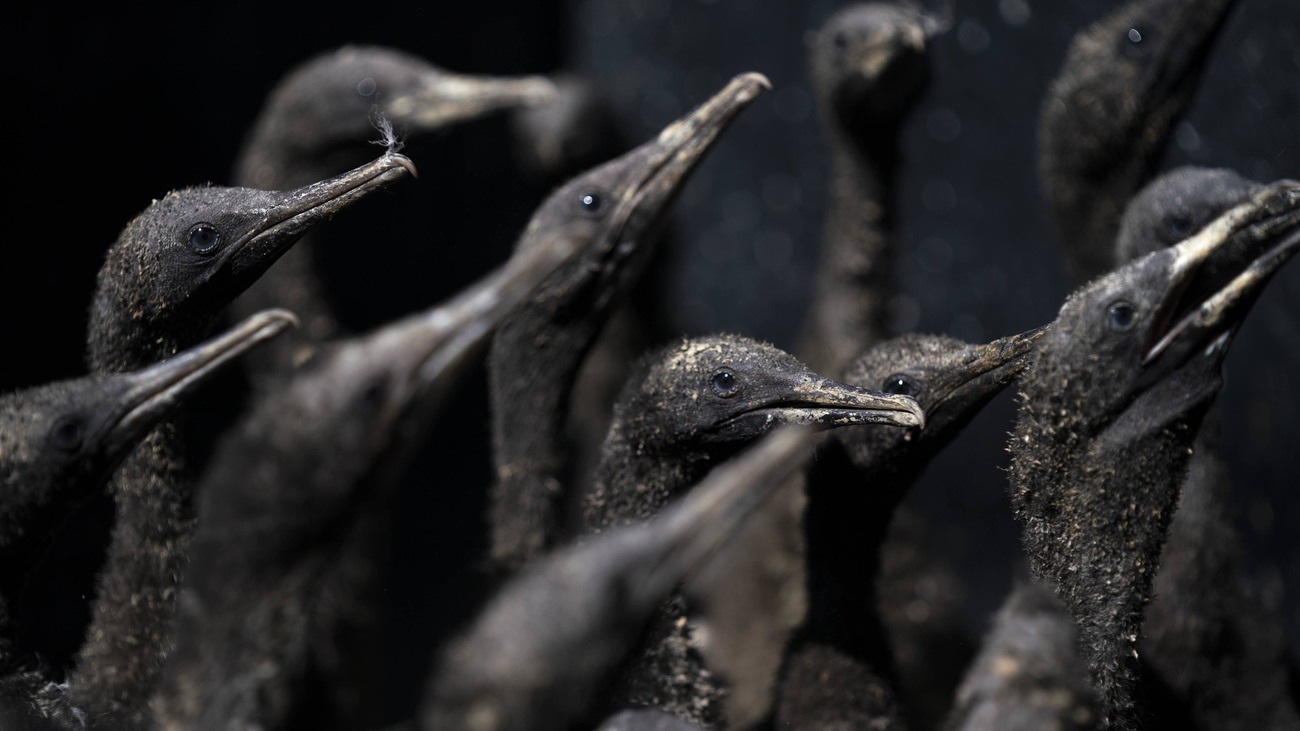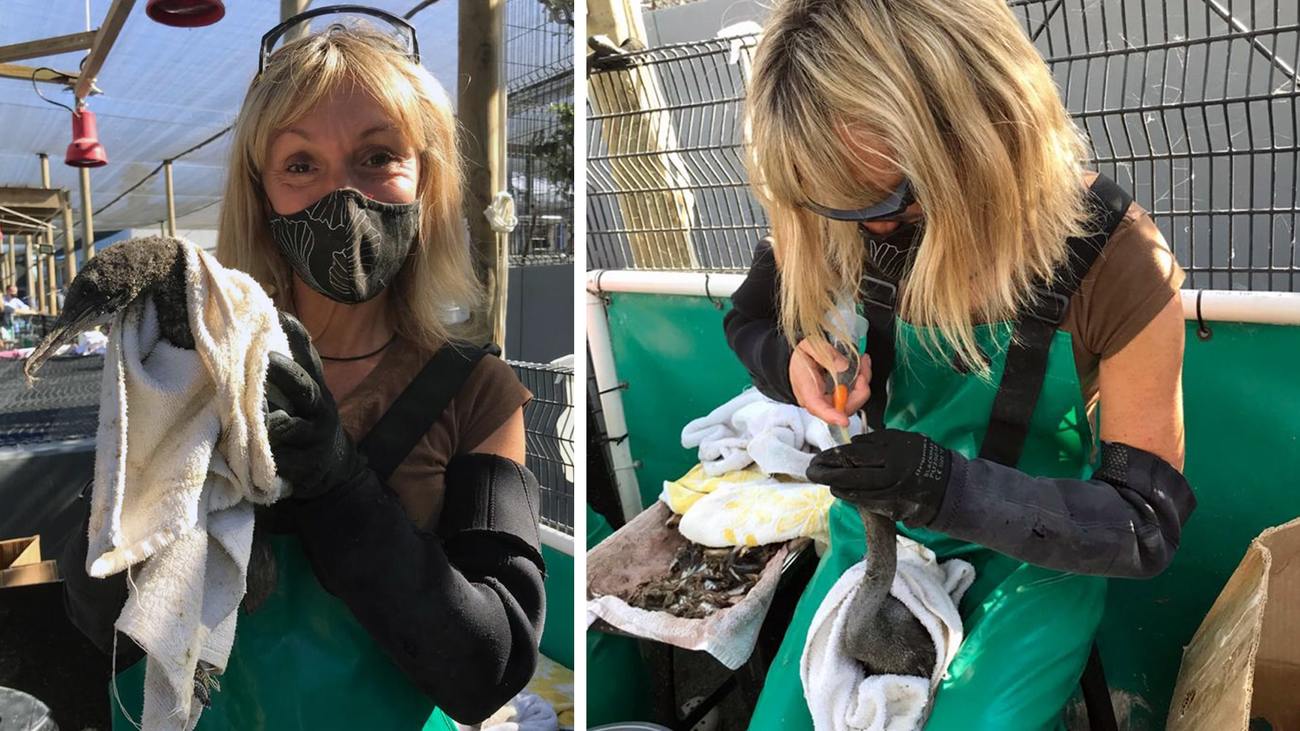one year anniversary of rescuing Cape cormorant chicks with SANCCOB
one year anniversary of rescuing Cape cormorant chicks with SANCCOB

January 2021, almost a year into the pandemic. A new variant of COVID-19 had been discovered in South Africa and the news was an endless daily toll of deaths, hospitalisations and infection rates. I should’ve been in the UK presenting ‘Winterwatch,’ the live series I present for the BBC, looking at British wildlife. I was going to be based up in Scotland. But travel restrictions had put a stop to that particular plan. So instead, I was doing the school run, listening to talk radio in Cape Town. My ears pricked up as I heard an interview from SANCCOB (Southern African Foundation for the Conservation of Coastal Birds) about thousands of Cape cormorant chicks that had been abandoned on Robben Island.
A huge rescue mission was underway with support from IFAW and they needed volunteers.
A few years ago, I filmed a series called ‘The Great Penguin Rescue’, following the penguin chick-bolstering programme at SANCCOB. I’d been trained as a volunteer, feeding hundreds of rescued African penguins. I knew I could be useful and knew I had some spare time, which is rare for me! I’m usually always travelling.
I signed up and was called in. My first shift was the 29th of January. It’s always a bit daunting turning up for the first time at SANCCOB. Everyone seems to know what to do and where to go and at first you feel a little out of your depth. It had been a few years since I’d tube-fed penguins and I was rusty. However, this was a crisis and it really was ‘all hands on deck.’ If you had any experience, you were of huge value and so like it or not, you were thrown into the deep end!
I was given a quick refresher and handed a cormorant. Under supervision, I did my first tube feeding (fluid rehydration therapy), which involves pushing a tube down the bird’s throat and into its stomach, avoiding the windpipe—otherwise the bird chokes and dies. Believe me, the first time is always nerve-wracking and the weight of responsibility is heavy. These are, after all, endangered birds. The first few birds were slow going, my heart was beating and my hands shaking, but it’s amazing how quickly you get the hang of it when under pressure—and at least I found tube feeding cormorants far easier than penguins.
Over the next few months, I volunteered every week. It was hectic. So many birds and so much poo! Volunteers who could tube feed and were comfortable handling the chicks were invaluable and in the beginning my shifts always involved tube feeding, either with rehydration fluid or liquidized fish. It was tiring, back-aching stuff and the queue of hungry, desperate chicks seemed endless.
As the chicks grew and got stronger the tube feeds became fewer and the chicks could be fed from a tray. It was important for the chicks not to associate food with humans at this stage, so when you were the one taking the food into the pens, you had to dress up in a black cape and hood. A comical Darth Vader look, but all for a good cause. As you went into the pen, the cormorants descended in a ravenous pack. It was hard not to fall over the scrambling beaks!

Not all of my shifts involved feeding—some days I was in the kitchen helping with the endless pile of washing up, liquidizing fish, preparing the trays. My least favourite job was, undoubtedly, the cleaning. Around 2,000 chicks, all in pens, produce a huge amount of poo. It’s a smelly job and a thankless task. I’m a bit of a perfectionist, but believe me, you are never going to get all that guano off. The white streaks remain, however hard you scrub. For days your hair has that slightly pungent fishy smell! Cleaning cormorant chick poo really isn’t a nice way to spend the afternoon, so it always amazed me just how many people volunteered to do it, shift after shift after shift! The interns at SANCCOB are the ones who deserve the most credit. We volunteers can pick and choose when we want to be scrubbers! The interns have to do it day after day, week after week.
After about two months of volunteering, some of the chicks were ready for release—they were strong, at the right weight and their feathers had been checked and proven to be waterproof. Release day is always the best day for anyone involved in rescue and rehabilitation. A day to celebrate, when all the hard work pays off. It was my final day volunteering before I flew to the UK, and I was invited on the release boat.
The chicks had been rescued from Robben Island, so that was where they would be released. It was the most gorgeous, sunny, windless day. The chicks had been checked, tagged and boxed and were on the ride to freedom. Once on the island, they were led into a pen to acclimatise. Then the pen door was opened, and they were on their way!
How poignant: these chicks were being given their freedom on an island famous for stripping prisoners of theirs. A second chance. I felt incredibly proud as we emptied all the boxes and watched our charges scurry off. Proud of all the volunteers who tirelessly give their time to save these endangered birds, proud of the SANCCOB staff and interns who work so hard and keep going from one desperate crisis to another, whether it’s penguins or cormorant chicks. Proud that there are people who want to help, who want to do the right thing, who have hope in their hearts and empathy in their souls. Proud that there is a selfless team of warriors who are happy to spend weeks of their summer smelling of fish and cormorant poo!
-Michaela Strachan
Michaela Strachan is a well known TV presenter in the UK. She has been presenting since 1986 on a variety of programmes from The Wide Awake Club to The Hitman And Her, The Really Wild Show to Michaela’s Wild Challenge, Elephant Diaries to Countryfile to Springwatch and many many more. She started off presenting children’s programmes but these days is known as a wildlife presenter and has travelled all over the world filming animals and conservation projects including 'The Great Penguin Rescue'.
Related content
Every problem has a solution, every solution needs support.
The problems we face are urgent, complicated and resistant to change. Real solutions demand creativity, hard work and involvement from people like you.